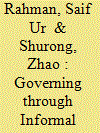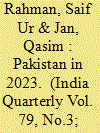| Srl | Item |
| 1 |
ID:
181881


|
|
|
|
|
| Summary/Abstract |
In their post-authoritarian period, civilian governments in transitional democracies have often been battered by unelected power centers. Where do these unelected forces derive their power? This article addresses this question through a case study of Pakistan. Since the 2018 elections, a decade after leaving formal political office, the Pakistani military has asserted greater control over civilian government. Using the concept of informal institutions of political participation as an analytical framework, we argue that when formal forms of control become untenable due to legitimacy and/or functional constraints, the military turns into a Janus-faced institution, visibly acting as a formal state organ while invisibly protecting its institutional interests through what we call “informal mechanisms.” The article explains how Pakistan’s pre-2018 political situation dictated a quasi-military regime more suited to the military’s interests than direct military rule.
|
|
|
|
|
|
|
|
|
|
|
|
|
|
|
|
| 2 |
ID:
192932


|
|
|
|
|
| Summary/Abstract |
Pakistan continues to face multiple sources of internal and external conflicts. Its all-powerful military is engaged in a subterranean battle to maintain its power. Economically, the country persisted in troubled waters as it has been for most of its recent history. In domestic politics, the failed experiment of a hybrid regime under Ex-Prime Minister Imran Khan forced the military to part ways with Mr Khan and install a coalition government of 13 political parties through a no-confidence vote in parliament in April 2022. Mr Khan’s political party is facing a severe crackdown in Pakistan after he accused the powerful military of his ouster from power. At the regional level, a favourable outcome in Afghanistan in the shape of the Taliban’s takeover has not yielded any significant positive results for Pakistan. After concluding the Afghan conflict on a favourable note, paradoxically, the military establishment hints at a desire to shift away from geo-security to geo-economics in its foreign policy goals. At the extra-regional level, the military is walking a tightrope to balance its ties between the USA and China to offset any adverse consequences arising from its strategic partnerships with China over China–Pakistan Economic Corridor (CPEC). In this article, we explain a series of issues confronting Pakistan currently—including a deep economic crisis, political paralysis, and a resurgent terror threat—focusing on the military’s ambitions in the region and beyond.
|
|
|
|
|
|
|
|
|
|
|
|
|
|
|
|